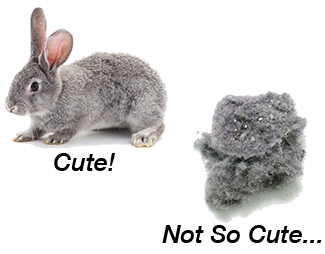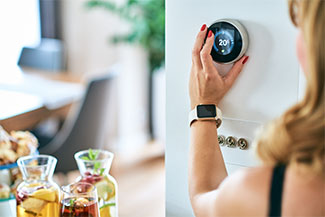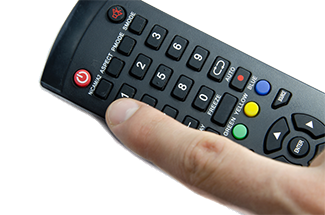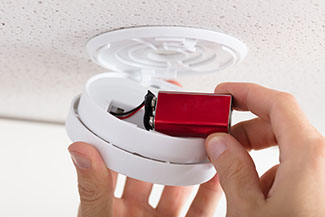Electronic Maintenance - It's A Must-Do
clean dust from thermostats, detectors, sensors, and replace batteries
In our ever-changing world of technology and the prices we pay for the latest advances in technology, it's important to keep our electronics in good working order by regularly cleaning them. Together with our friends at HomeZada digital home management, we have some tips for cleaning electronics around your home.
 Little Bunny Foo Foo hopping through the . . . living room, dining room, den, everywhere!
Little Bunny Foo Foo hopping through the . . . living room, dining room, den, everywhere!
Bunny rabbits are cute. Dust bunnies, not so much. They can be a danger to your safety. Dust bunnies can be a fire hazard if they collect near electronics and sockets. If sparks fly, they can ignite and cause a fire. Regular dusting and vacuuming with a hose can significantly reduce the amount of dust that lingers near your electrical outlets and appliances. One place dust bunnies thrive and multiply, like real bunnies, are the back of entertainment centers, behind desks, the back of computer towers and cabinets, and under beds. Take the time to move furniture and get rid of them before they get out of control.
Security Camera Sensors
Rosie-Certified partner, Tekna Security & Smarthome, reminds us that keeping the sensors and lenses of security cameras clean is a critical aspect of keeping us safe. Use a dry microfiber cloth, the same kind you can get from an eyewear or optometry store. Before wiping, give the unit a little blast of compressed air.
"It's also a good idea to know if the lenses and covers of your cameras are plastic or glass," said Tekna's Life Safety Specialist, Jared Wright. "Most of the inexpensive cameras from big box stores will be plastic. Like your car's headlights, these will yellow and oxidize after a year or two and then there's not much you can do. They'll never return to "like new" and the image will always be inferior if you don't maintain them."
If purchasing security cameras, ensure all lenses and covers are glass and are weather rated for 50 degrees Celsius or better (they come from China which often uses Celsius ratings on the box).
Thermostats
Thermostats typically do not require cleaning beyond a light dusting. If it is a touchscreen, use a dry microfiber cloth. Some thermostats require a battery that needs to be changed from time to time. Refer to the manual for information.
Remote Controls & Video Game Consoles
The beloved remote control is one of the most germ-infested items in the house. Using disinfectant wipes, wipe down all remote and video game controls. Use a cotton swab and a bit of rubbing alcohol to get into the areas between the buttons. By the way, when staying in a hotel room, be sure to disinfect the remote control with sanitizing wipes and then wash your hands. At least at home you know who's touched the remote. Yup, EWW!!!
Television and Computer Screens
There are cleaners specifically made for screens that do not contain oils or waxes, such as JAWS Just Add Water System's System's glass cleaner. For television and electronics, spray the rag first then gently wipe clean. Using a soft cloth or microfiber cloth, wipe the screen clean. Make sure the cloth is lint-free. Otherwise you are adding lint all over your screens. Your screens will be lint, dust and fingerprint-free.

Computer Keyboard and Accessories
No matter how much handwashing you do, your fingers carry bacteria and oils that could cause the keys to stick and get dirty. With your computer off, gently wipe down the keyboard with a soft cloth. Gently spray a cleaner on your cloth. Do not spray directly on the computer keys. You can also use handy wipes on these keyboards and use compressed air to blow dust and crumbs from beneath the keys.
Once you have wiped the keyboard, using compressed air, spray between the keys. The air will release any debris that has fallen between the keys. You may need to take a quick wipe of the keyboard. However, you can use a dry cloth at this point. Use the same wipes to clean your computer accessories, like the mouse, mouse pads, and covers.
Keep beverages far away from keyboard and laptops. One of our staffers can tell you from personal experience that sweet tea and keyboards just don't mix.
Cell Phones
Time Magazine reported a study that found more than 17,000 bacterial gene copies on the cell phones of high school students. Scientists at the University of Arizona found that cell phones carry 10 times more bacteria than most toilet seats. One of the worst places to use your phone is in the bathroom. When toilets flush, germs spread everywhere. That is how fecal bacteria like E. coli end up on phones. Think about that next time you borrow someone's phone.

To prevent your phone from becoming a petri dish, clean it regularly by using a similar method to clean computer screens. For home phones use disinfecting wipes to remove bacteria from the unit.
Test Smoke Alarms and Replace Batteries
You want smoke alarms to work well when there is an actual fire. What you do not want is for them to start beeping at two o'clock in the morning telling you it's time to change the batteries. Test smoke alarms every month. If you can't remember when you replaced the batteries, replace them now. Keep an assortment of fresh batteries on hand.
It's surprising how much dust, bacteria and germs build-up on our electronics. Get into a regular cleaning habit and avoid illness and fire.
Home Maintenance To-Do | #ElectronicMaintenance
###
Photo Credits:
- Rosie on the House
